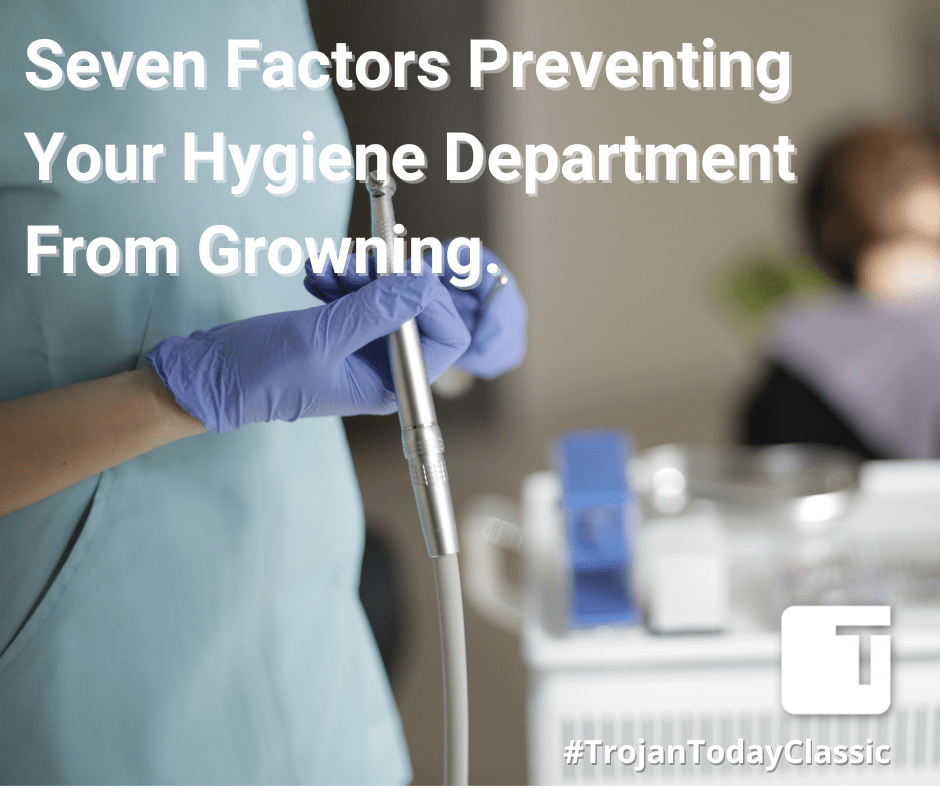Originally published November 2016 in Trojan Today.
“If I had eight hours to chop down a tree,
I would spend six hours sharpening my axe.”
– Abraham Lincoln
Is your hygiene department swinging a dull axe? Sharpening your protocols reduces stress, facilitates quality of care, and increases profitability. Those experiencing frustration in their hygiene departments often share similar challenges.
COMMONLY HEARD FROM DENTISTS:
“We see very little profit from our hygiene department.
Our hygienist is not seeing enough patients.”
TRANSLATION
I don’t know if we can afford a hygienist.
COMMONLY HEARD FROM HYGIENIST:
I’m working hard and I haven’t had a full hour lunch in a month.
The schedule is hit or miss. I don’t have any patients, or I’m double booked.
TRANSLATION:
The hygiene department consists of me.
I need support from other team members.
We have a solution.
Having assisted hundreds of practices in implementing, improving, or modernizing hygiene departments, we have identified seven factors hat low producing hygiene departments have in common.
FACTOR 1: The belief that more hygiene patients = More hygiene department profit
This belief perpetuates the problem. The number of patients a hygienist provides care for in a day is not as important as the revenue per patient. When a hygiene department becomes a prophy machine, it loses opportunity and provides substandard care.
FACTOR 2: Treatment performed does not meet the standard of care
When you look at your clinical notes, do you see “4 – 5 mm pockets, moderate bleeding and light to moderate supra and sub calculus” followed by “prophy completed. Next visit—6 month recall?”
It’s likely the schedule said “Prophy” and the patient wanted her “teeth cleaned.” Implementing a comprehensive approach to hygiene results in treatments that are indicated for the patient’s level of disease, elevation of the patient perception of the practice, and a profitable business.
FACTOR 3: Four Bitewings
An FMX causes havoc with the hygiene schedule; however, the full mouth series is important. A pano does not provide the same opportunity to diagnose perio, endo, hygiene, and restorative. The rule of thumb in any business is “use each team member to the highest extent of his/her abilities.” We want the DDS doing dentistry, the RDH doing hygiene, the DA’s facilitating these production-generators, and the front office supporting the process.
Hygiene time should be reserved for the perio evaluation (which is facilitated by the FMX), the education/treatment recommendations by the RDH and initiation of treatment. Having patients arrive in the hygiene chair with x-rays already exposed will facilitate this. This also converts our Dental Assistant into a Producer.
FACTOR 4: “Spot Probing”
The single most important tool a hygienist has in influencing patient health and hygiene production is the Comprehensive Periodontal Assessment.
An abundance of evidence supports the oral-systemic link of the eighteen different diseases that are currently associated with periodontal disease. The modern RDH must complete a full body analysis: review medicines, diet, lifestyle habits, family history, oral hygiene habits, fluoride exposure, and causative factors. Excellence in hygiene! THIS is the key to increasing hygiene production.
FACTOR 5: Scaling and Root Planing
Changing our approach to a “medical disease of the mouth” and providing customized and comprehensive hygiene recommendations result in profit and a full schedule of people who refer their friends and family. In the year 2000, the Surgeon General made it clear that sick gums mean a sick body. We do a disservice to patients and the profitability of the practice when we are calculus removers rather than comprehensive health care providers. When this is omitted, we have low patient retention.
Advanced technologies, such as adjunctive laser therapies, to reduce gram-negative anaerobic bacteria and bio-stimulate the patient’s own immune system offer your patients an additional weapon against disease.
FACTOR 6: Full Mouth Debridement
The full mouth debridement is considered a diagnostic modality. When a patient has so much calculus that you cannot do a proper diagnosis, we remove the calculus that interferes with visibility. Dental practices that are routinely billing for this are exposed to liability, are initiating unnecessary bacteremias, devaluing the benefits of hygiene services, and missing opportunities. Patients who have a mouth that just “feels clean” are less likely to return for their periodontal therapy because the potential ramifications of their periodontal disease has not been clearly communicated.
FACTOR 7: Performing as a prophy practice
The prophy is a preventive procedure defined as “removal of plaque, calculus, and stains from the tooth structures in the permanent and transitional dentition. It is intended to control local irritational factors.” The D1110 procedure is indicated for the patient that is “generally healthy.”
Depending on the study, 70 – 95% of the adult population in North America has some degree of periodontal disease. This means 70 – 95% of adult patients should be receiving more than a prophy. Patients who truly understand what periodontal health is and the detrimental impact of periodontal disease on the entire body become motivated to find out what needs to be done to treat their diseases. We must be careful to diagnose for the patient, not the insurance company.
Creating, developing, and implementing excellent protocols (axe sharpening) and a team that works together to deliver a patient experience that has “Wow!” factor (efficiently chopping the tree) will raise the patient perception of your practice, deliver higher quality of care, and increase production and profitability.
Ramona Colbert is the founder and CEO of 1 Source Solutions and has more than twenty-five years of dental practice management strategy consulting experience.
FMI: 310.344.5846
Tracy Baker has more than twenty-five years of experience in clinical dental hygiene.

